Abstract
A multivariate analysis of anti-acetylcholine receptor (AChR) antibodies and clinical parameters other than treatment (modified Osserman groups, age, type of onset, sex, and thymus pathology) was performed for all incident (n = 366) myasthenia gravis (MG) cases in its white population in Denmark during the past 15 years. Sera from 244 healthy individuals and from 295 patients with diseases other than MG were analysed as controls. Formal statistics for the anti-AChR antibodies assay (immunoprecipitation RIA using crude human AChR extract) were calculated. The distribution of antibodies titres greater than 0.1 nMole/l was found to be approximately lognormal. For MG patients the 95% reference interval was 0.2-1549 nMoles/l, and in control sera the range was 0.0-0.4 nMole/l. Using 0.5 nMole/l as the cut-off level and regarding all results less than this value as normal titres, it appeared that the assay was highly specific (> 99.99%) for MG. In a population of MG patients significance should be attributed to values in the range 0.3-0.4 nMole/l. The overall diagnostic sensitivity was found to be 88%. The sensitivity appeared to be proportionate to clinical severity of MG. The percentage with a normal titre was higher (16%) for early onset of MG, compared with 7% for late onset. No significant difference in relation to the frequency of "negative titre" was found in relation to sex. Anti-AChR antibodies titre was found to correlate with clinical severity, female or male gender, and pathology of thymus. The groups of MG patients were not matched for the various clinical parameters but multiple regression analysis controlling for these variables revealed independent effects of clinical severity and sex though not of age. Normal thymus (including involuted gland) and thymoma were correlated with low to intermediate tires, and hyperplastic thymus with high level of antibodies. The clinical implementation of anti-AchR antibodies is reviewed from 1976 and up to the present. The problems with false positive results are thoroughly expounded.
Full text
PDF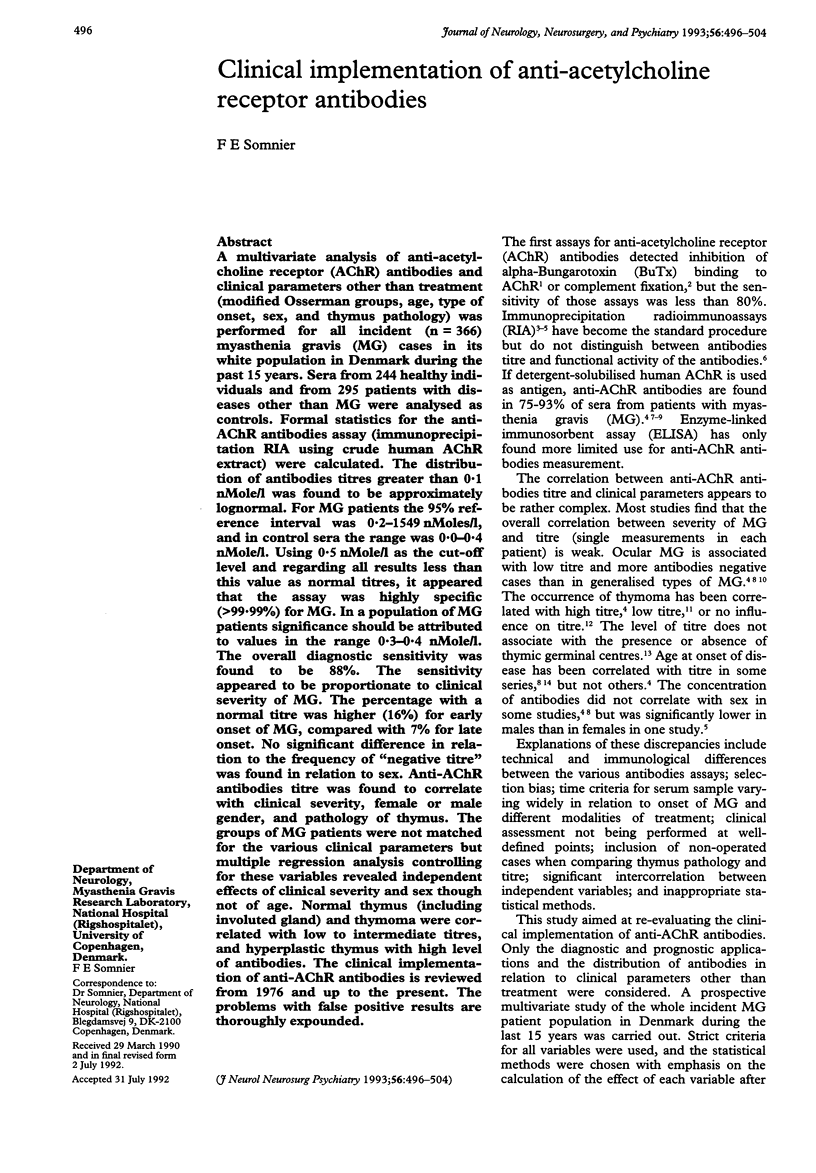
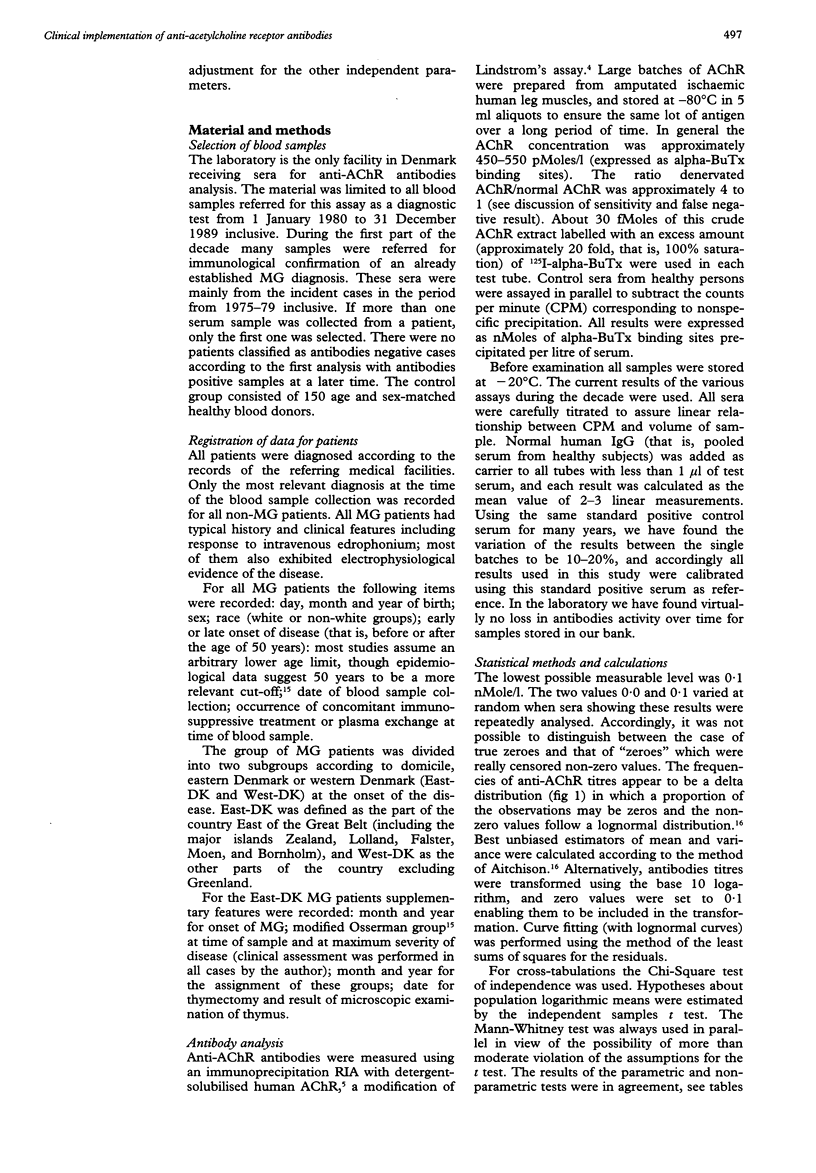
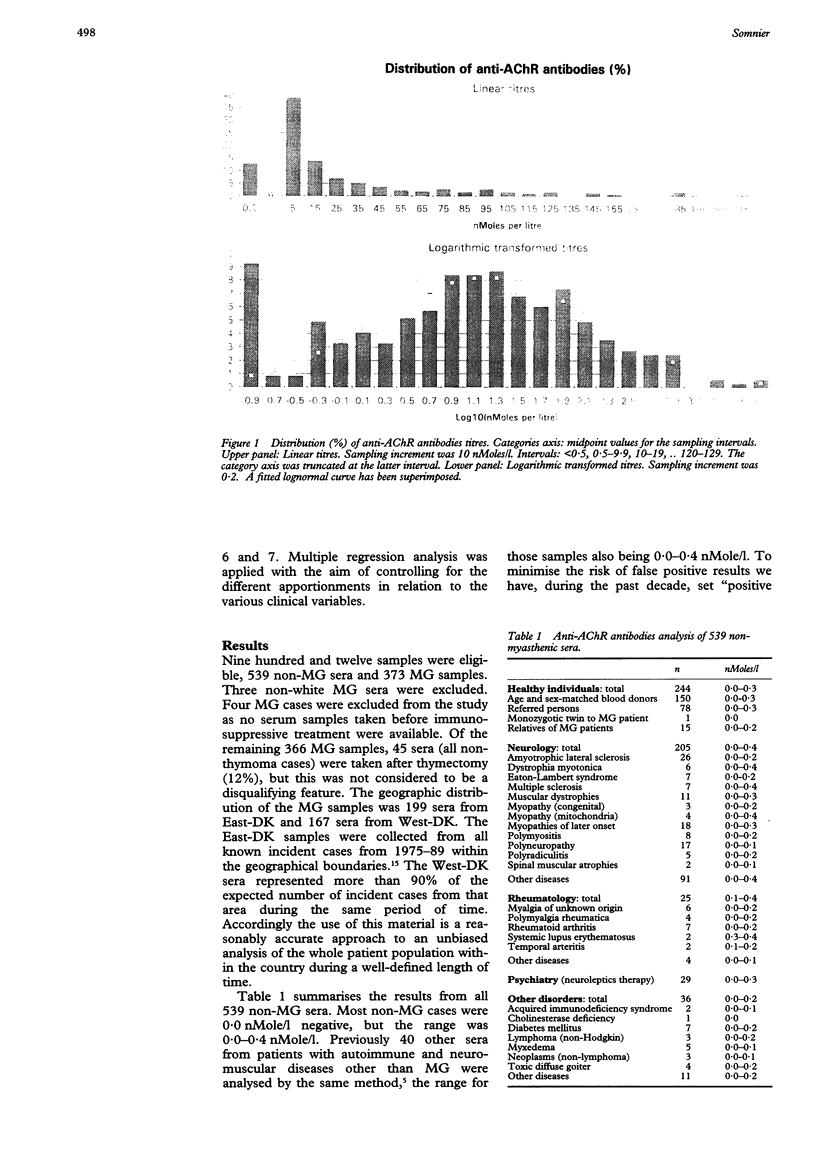
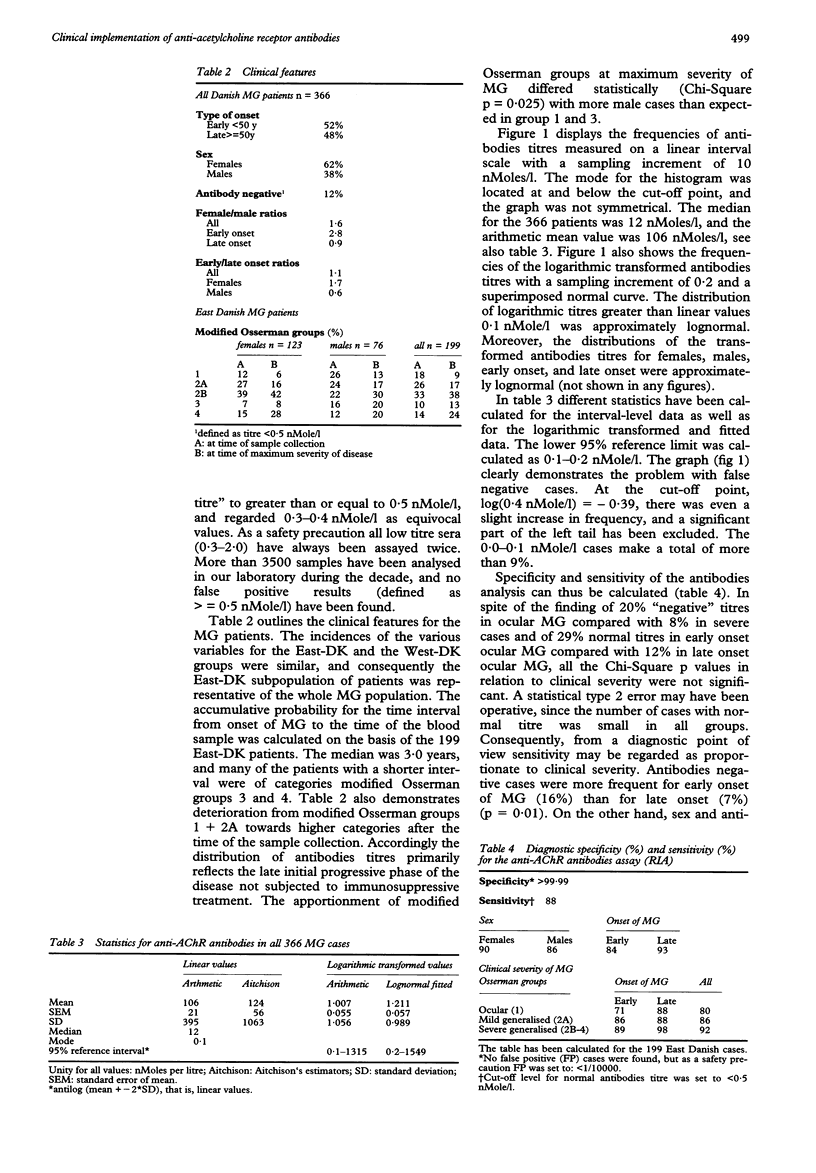
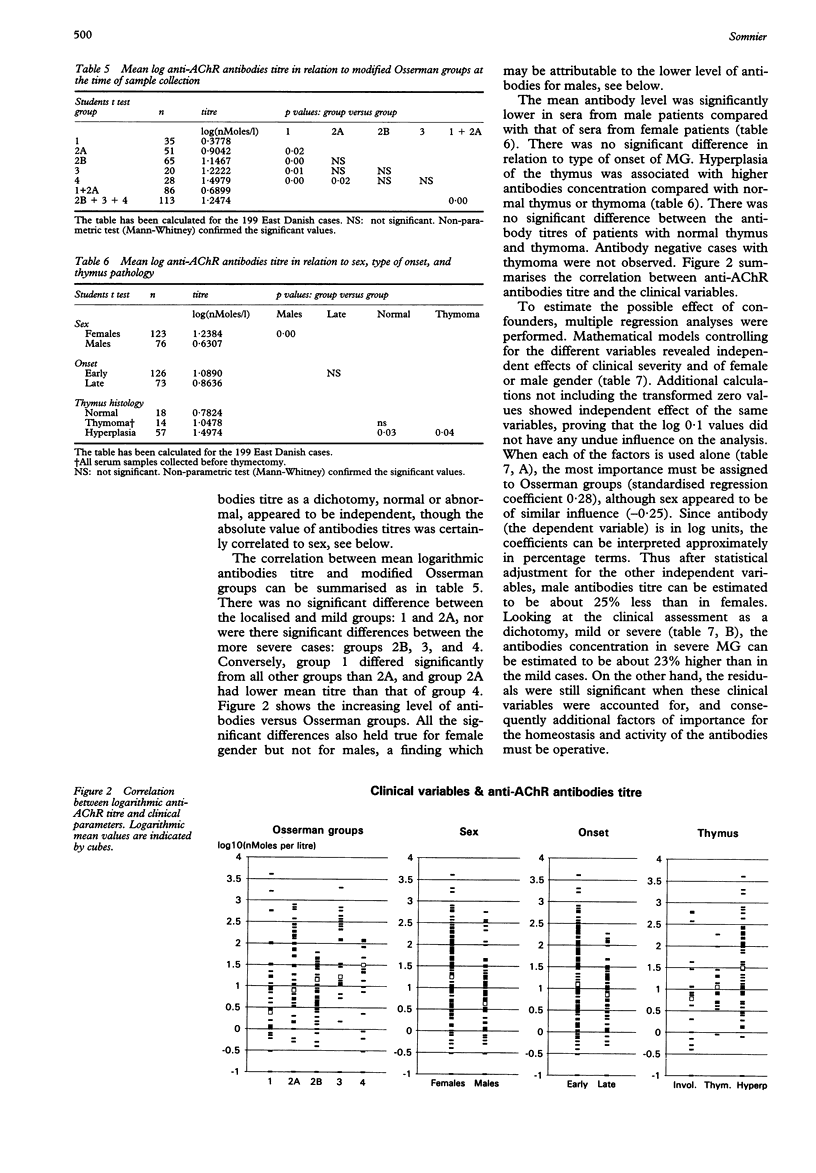
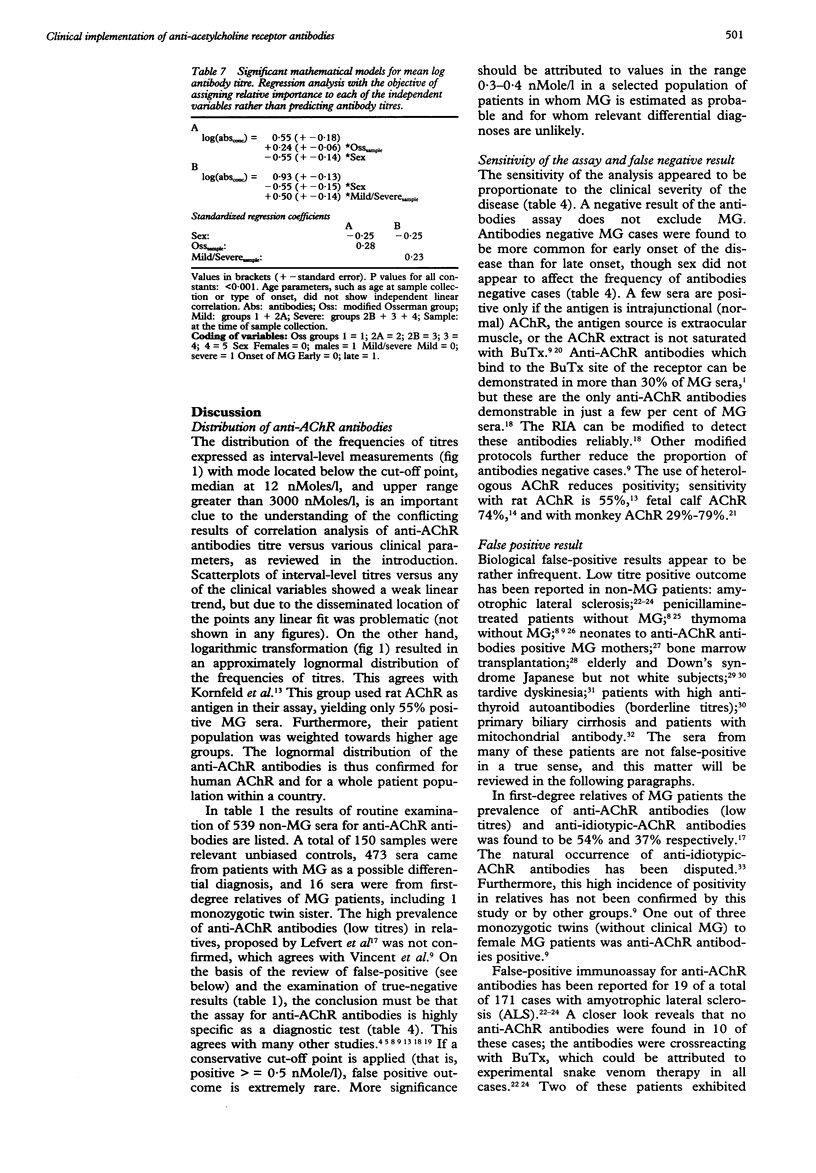
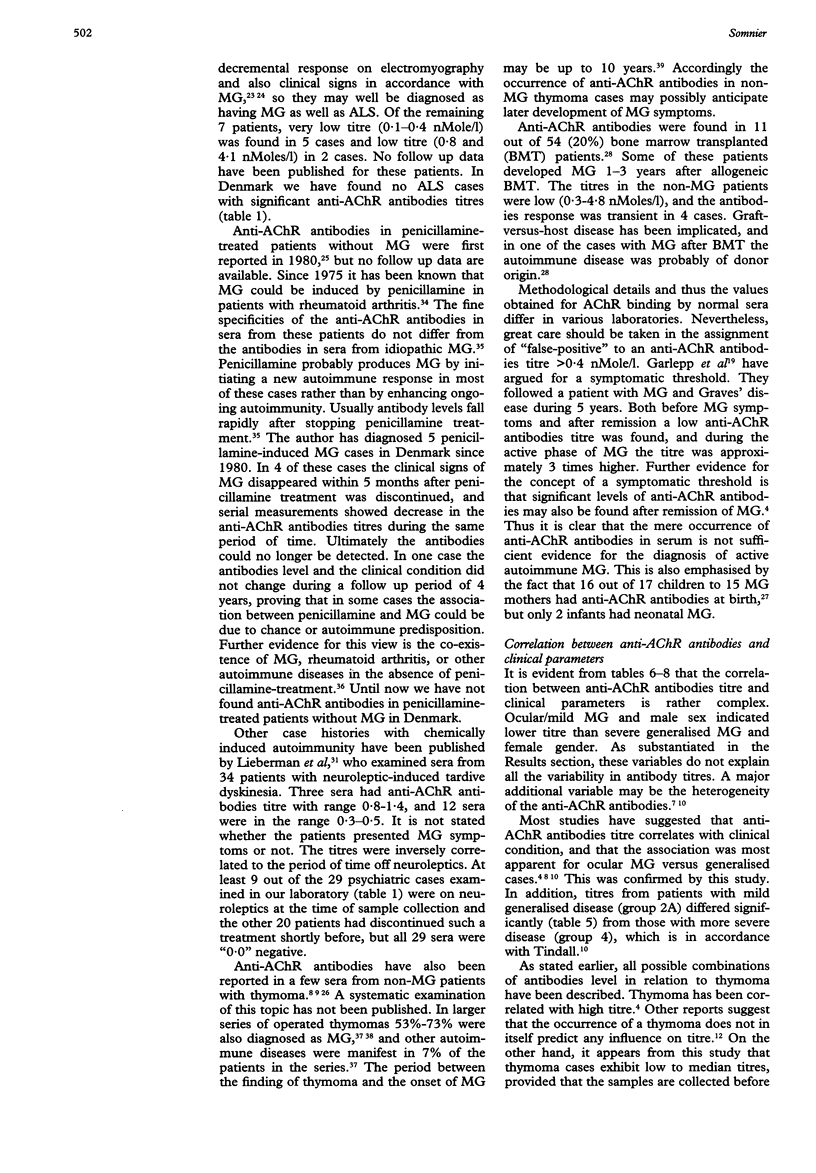
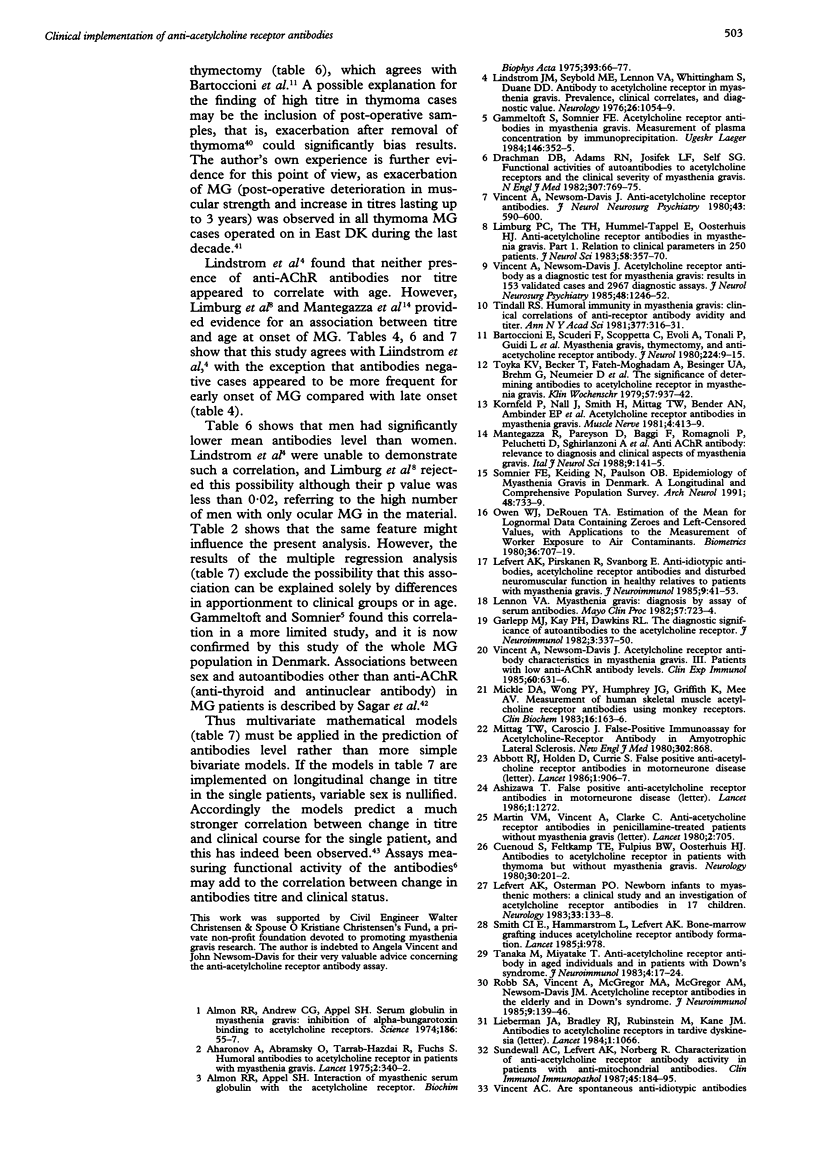
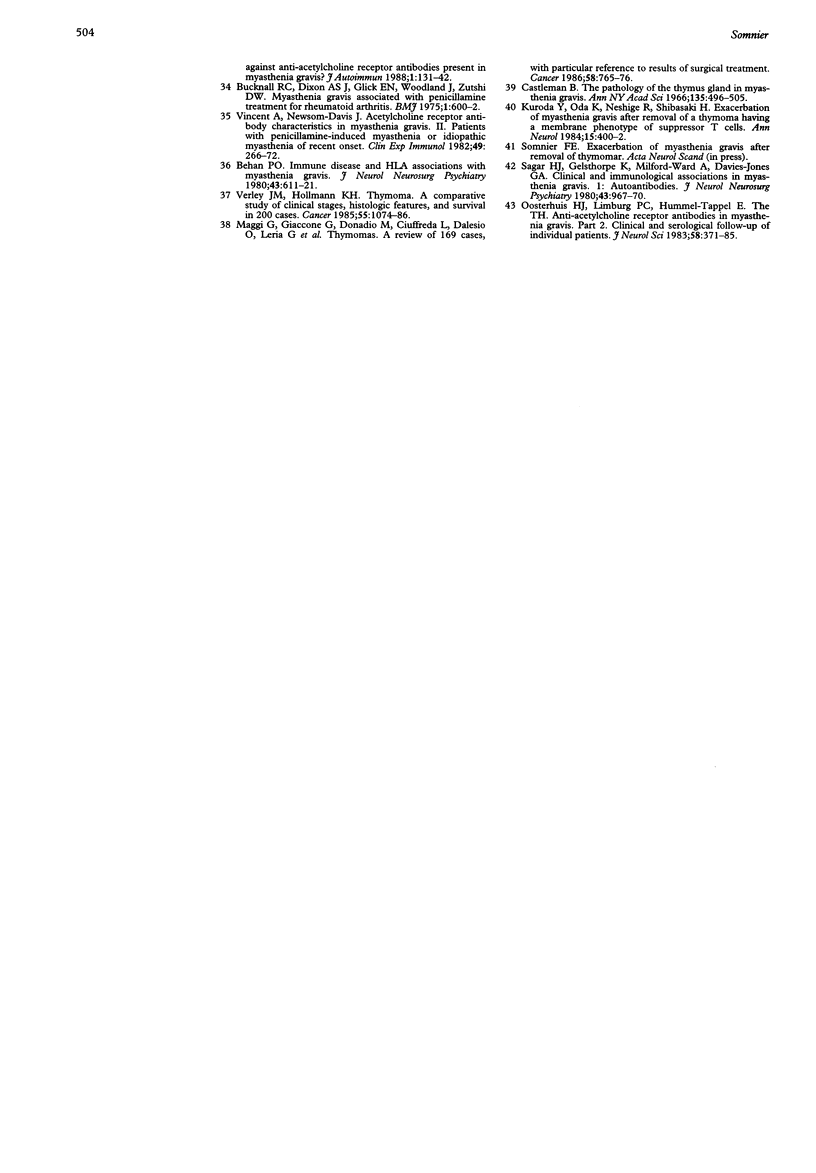
Images in this article
Selected References
These references are in PubMed. This may not be the complete list of references from this article.
- Abbott R. J., Holden D., Currie S. False positive anti-acetylcholine receptor antibodies in motorneurone disease. Lancet. 1986 Apr 19;1(8486):906–907. doi: 10.1016/s0140-6736(86)91005-6. [DOI] [PubMed] [Google Scholar]
- Aharonov A., Abramsky O., Tarrab-Hazdai R., Fuchs S. Humoral antibodies to acetylcholine receptor in patients with myasthenia gravis. Lancet. 1975 Aug 23;2(7930):340–342. doi: 10.1016/s0140-6736(75)92779-8. [DOI] [PubMed] [Google Scholar]
- Almon R. R., Andrew C. G., Appel S. H. Serum globulin in myasthenia gravis: inhibition of alpha-bungarotoxin binding to acetylcholine receptors. Science. 1974 Oct 4;186(4158):55–57. doi: 10.1126/science.186.4158.55. [DOI] [PubMed] [Google Scholar]
- Almon R. R., Appel S. H. Interaction of myasthenic serum globulin with the acetylcholine receptor. Biochim Biophys Acta. 1975 May 30;393(1):66–77. doi: 10.1016/0005-2795(75)90217-2. [DOI] [PubMed] [Google Scholar]
- Ashizawa T. False positive anti-acetylcholine receptor antibodies in motorneurone disease. Lancet. 1986 May 31;1(8492):1272–1272. doi: 10.1016/s0140-6736(86)91408-x. [DOI] [PubMed] [Google Scholar]
- Bartoccioni E., Scuderi F., Scoppetta C., Evoli A., Tonali P., Guidi L., Bartoloni C., Terranova T. Myasthenia gravis, thymectomy, and antiacetycholine receptor antibody. J Neurol. 1980;224(1):9–15. doi: 10.1007/BF00313202. [DOI] [PubMed] [Google Scholar]
- Behan P. O. Immune disease and HLA associations with myasthenia gravis. J Neurol Neurosurg Psychiatry. 1980 Jul;43(7):611–621. doi: 10.1136/jnnp.43.7.611. [DOI] [PMC free article] [PubMed] [Google Scholar]
- Bucknall R. C., Dixon A St J., Glick E. N., Woodland J., Zutshi D. W. Myasthenia gravis associated with penicillamine treatment for rheumatoid arthritis. Br Med J. 1975 Mar 15;1(5958):600–602. doi: 10.1136/bmj.1.5958.600. [DOI] [PMC free article] [PubMed] [Google Scholar]
- Castleman B. The pathology of the thymus gland in myasthenia gravis. Ann N Y Acad Sci. 1966 Jan 26;135(1):496–505. doi: 10.1111/j.1749-6632.1966.tb45497.x. [DOI] [PubMed] [Google Scholar]
- Cuénoud S., Feltkamp T. E., Fulpius B. W., Oosterhuis H. J. Antibodies to acetylcholine receptor in patients with thymoma but without myasthenia gravis. Neurology. 1980 Feb;30(2):201–202. doi: 10.1212/wnl.30.2.201. [DOI] [PubMed] [Google Scholar]
- Drachman D. B., Adams R. N., Josifek L. F., Self S. G. Functional activities of autoantibodies to acetylcholine receptors and the clinical severity of myasthenia gravis. N Engl J Med. 1982 Sep 23;307(13):769–775. doi: 10.1056/NEJM198209233071301. [DOI] [PubMed] [Google Scholar]
- Garlepp M. J., Kay P. H., Dawkins R. L. The diagnostic significance of autoantibodies to the acetylcholine receptor. J Neuroimmunol. 1982 Dec;3(4):337–350. doi: 10.1016/0165-5728(82)90036-4. [DOI] [PubMed] [Google Scholar]
- Kornfeld P., Nall J., Smith H., Mittag T. W., Bender A. N., Ambinder E. P., Horowitz S. H., Papatestas A. E., Gross H., Genkins G. Acetylcholine receptor antibodies in myasthenia gravis. Muscle Nerve. 1981 Sep-Oct;4(5):413–419. doi: 10.1002/mus.880040510. [DOI] [PubMed] [Google Scholar]
- Kuroda Y., Oda K., Neshige R., Shibasaki H. Exacerbation of myasthenia gravis after removal of a thymoma having a membrane phenotype of suppressor T cells. Ann Neurol. 1984 Apr;15(4):400–402. doi: 10.1002/ana.410150416. [DOI] [PubMed] [Google Scholar]
- Lefvert A. K., Osterman P. O. Newborn infants to myasthenic mothers: a clinical study and an investigation of acetylcholine receptor antibodies in 17 children. Neurology. 1983 Feb;33(2):133–138. doi: 10.1212/wnl.33.2.133. [DOI] [PubMed] [Google Scholar]
- Lefvert A. K., Pirskanen R., Svanborg E. Anti-idiotypic antibodies, acetylcholine receptor antibodies and disturbed neuromuscular function in healthy relatives to patients with myasthenia gravis. J Neuroimmunol. 1985 Jul;9(1-2):41–53. doi: 10.1016/s0165-5728(85)80005-9. [DOI] [PubMed] [Google Scholar]
- Lennon V. A. Myasthenia gravis: diagnosis by assay of serum antibodies. Mayo Clin Proc. 1982 Nov;57(11):723–724. [PubMed] [Google Scholar]
- Lieberman J. A., Bradley R. J., Rubinstein M., Kane J. M. Antibodies to acetylcholine receptors in tardive dyskinesia. Lancet. 1984 May 12;1(8385):1066–1066. doi: 10.1016/s0140-6736(84)91465-x. [DOI] [PubMed] [Google Scholar]
- Limburg P. C., The T. H., Hummel-Tappel E., Oosterhuis H. J. Anti-acetylcholine receptor antibodies in myasthenia gravis. Part 1. Relation to clinical parameters in 250 patients. J Neurol Sci. 1983 Mar;58(3):357–370. doi: 10.1016/0022-510x(83)90095-3. [DOI] [PubMed] [Google Scholar]
- Lindstrom J. M., Seybold M. E., Lennon V. A., Whittingham S., Duane D. D. Antibody to acetylcholine receptor in myasthenia gravis. Prevalence, clinical correlates, and diagnostic value. Neurology. 1976 Nov;26(11):1054–1059. doi: 10.1212/wnl.26.11.1054. [DOI] [PubMed] [Google Scholar]
- Maggi G., Giaccone G., Donadio M., Ciuffreda L., Dalesio O., Leria G., Trifiletti G., Casadio C., Palestro G., Mancuso M. Thymomas. A review of 169 cases, with particular reference to results of surgical treatment. Cancer. 1986 Aug 1;58(3):765–776. doi: 10.1002/1097-0142(19860801)58:3<765::aid-cncr2820580326>3.0.co;2-s. [DOI] [PubMed] [Google Scholar]
- Mantegazza R., Pareyson D., Baggi F., Romagnoli P., Peluchetti D., Sghirlanzoni A., Cornelio F. Anti AChR antibody: relevance to diagnosis and clinical aspects of myasthenia gravis. Ital J Neurol Sci. 1988 Apr;9(2):141–145. doi: 10.1007/BF02337460. [DOI] [PubMed] [Google Scholar]
- Martin V. M., Vincent A., Clarke C. Anti-acetycholine receptor antibodies in penicillamine treated patients without myasthenia gravis. Lancet. 1980 Sep 27;2(8196):705–705. doi: 10.1016/s0140-6736(80)92753-1. [DOI] [PubMed] [Google Scholar]
- Mickle D. A., Wong P. Y., Humphrey J. G., Griffith K., Mee A. V. Measurement of human skeletal muscle acetylcholine receptor antibodies using monkey receptors. Clin Biochem. 1983 Jun;16(3):163–166. doi: 10.1016/s0009-9120(83)90195-9. [DOI] [PubMed] [Google Scholar]
- Mittag T. W., Caroscio J. False-positive immunoassay for acetylcholine-receptor antibody in amyotrophic lateral sclerosis. N Engl J Med. 1980 Apr 10;302(15):868–868. doi: 10.1056/NEJM198004103021520. [DOI] [PubMed] [Google Scholar]
- Oosterhuis H. J., Limburg P. C., Hummel-Tappel E., The T. H. Anti-acetylcholine receptor antibodies in myasthenia gravis. Part 2. Clinical and serological follow-up of individual patients. J Neurol Sci. 1983 Mar;58(3):371–385. doi: 10.1016/0022-510x(83)90096-5. [DOI] [PubMed] [Google Scholar]
- Robb S. A., Vincent A., McGregor M. A., McGregor A. M., Newsom-Davis J. M. Acetylcholine receptor antibodies in the elderly and in Down's syndrome. J Neuroimmunol. 1985 Aug;9(3-4):139–146. doi: 10.1016/s0165-5728(85)80014-x. [DOI] [PubMed] [Google Scholar]
- Sagar H. J., Gelsthorpe K., Milford-Ward A., Davies-Jones G. A. Clinical and immunological associations in myasthenia gravis. 1: Autoantibodies. J Neurol Neurosurg Psychiatry. 1980 Nov;43(11):967–970. doi: 10.1136/jnnp.43.11.967. [DOI] [PMC free article] [PubMed] [Google Scholar]
- Smith C. I., Hammarström L., Lefvert A. K. Bone-marrow grafting induces acetylcholine receptor antibody formation. Lancet. 1985 Apr 27;1(8435):978–978. doi: 10.1016/s0140-6736(85)91742-8. [DOI] [PubMed] [Google Scholar]
- Somnier F. E., Keiding N., Paulson O. B. Epidemiology of myasthenia gravis in Denmark. A longitudinal and comprehensive population survey. Arch Neurol. 1991 Jul;48(7):733–739. doi: 10.1001/archneur.1991.00530190081019. [DOI] [PubMed] [Google Scholar]
- Somnier F. E., Szpirt W., Kjersem H., Gammeltoft S., Boysen G., Jørgensen J. I. Behandling af myasthenia gravis med plasmaseparation. Ugeskr Laeger. 1984 Jan 30;146(5):348–352. [PubMed] [Google Scholar]
- Sundewall A. C., Lefvert A. K., Norberg R. Characterization of anti-acetylcholine receptor antibody activity in patients with anti-mitochondrial antibodies. Clin Immunol Immunopathol. 1987 Nov;45(2):184–195. doi: 10.1016/0090-1229(87)90033-x. [DOI] [PubMed] [Google Scholar]
- Tanaka M., Miyatake T. Anti-acetylcholine receptor antibody in aged individuals and in patients with Down's syndrome. J Neuroimmunol. 1983 Feb;4(1):17–24. doi: 10.1016/0165-5728(83)90060-7. [DOI] [PubMed] [Google Scholar]
- Tindall R. S. Humoral immunity in myasthenia gravis: clinical correlations of anti-receptor antibody avidity and titer. Ann N Y Acad Sci. 1981;377:316–331. doi: 10.1111/j.1749-6632.1981.tb33741.x. [DOI] [PubMed] [Google Scholar]
- Toyka K. V., Becker T., Fateh-Moghadam A., Besinger U. A., Brehm G., Neumeier D., Heininger K., Birnberger K. L. Die Bedeutung der Bestimmung von Antikörpern gegen Acetylcholinreceptoren in der Diagnostik der Myasthenia gravis. Klin Wochenschr. 1979 Sep 17;57(18):937–942. doi: 10.1007/BF01478550. [DOI] [PubMed] [Google Scholar]
- Verley J. M., Hollmann K. H. Thymoma. A comparative study of clinical stages, histologic features, and survival in 200 cases. Cancer. 1985 Mar 1;55(5):1074–1086. doi: 10.1002/1097-0142(19850301)55:5<1074::aid-cncr2820550524>3.0.co;2-t. [DOI] [PubMed] [Google Scholar]
- Vincent A. C. Are spontaneous anti-idiotypic antibodies against anti-acetylcholine receptor antibodies present in myasthenia gravis? J Autoimmun. 1988 Apr;1(2):131–142. doi: 10.1016/0896-8411(88)90021-2. [DOI] [PubMed] [Google Scholar]
- Vincent A., Newsom Davis J. Anti-acetylcholine receptor antibodies. J Neurol Neurosurg Psychiatry. 1980 Jul;43(7):590–600. doi: 10.1136/jnnp.43.7.590. [DOI] [PMC free article] [PubMed] [Google Scholar]
- Vincent A., Newsom-Davis J. Acetylcholine receptor antibody as a diagnostic test for myasthenia gravis: results in 153 validated cases and 2967 diagnostic assays. J Neurol Neurosurg Psychiatry. 1985 Dec;48(12):1246–1252. doi: 10.1136/jnnp.48.12.1246. [DOI] [PMC free article] [PubMed] [Google Scholar]
- Vincent A., Newsom-Davis J. Acetylcholine receptor antibody characteristics in myasthenia gravis. II. Patients with penicillamine-induced myasthenia or idiopathic myasthenia of recent onset. Clin Exp Immunol. 1982 Aug;49(2):266–272. [PMC free article] [PubMed] [Google Scholar]
- Vincent A., Newsom-Davis J. Acetylcholine receptor antibody characteristics in myasthenia gravis. III. Patients with low anti-AChR antibody levels. Clin Exp Immunol. 1985 Jun;60(3):631–636. [PMC free article] [PubMed] [Google Scholar]



